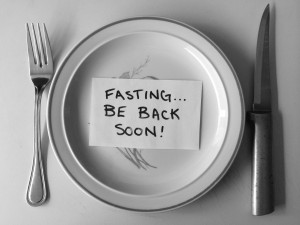 A fast is defined as the following by the medical dictionary: “is voluntarily not eating food for varying lengths of time.” It is used as a medical therapy and/or a spiritual practice. As some of you may know, my husband and I recently completed a 40 day fast, where we only ate 1 meal per day. This fast was the first one for which we embarked on such a task, and as a result, we learned much from it. It is my hope that this blog will help provide you with some resources and information to help you if you ever choose to complete a fast (of various types) yourself.
A fast is defined as the following by the medical dictionary: “is voluntarily not eating food for varying lengths of time.” It is used as a medical therapy and/or a spiritual practice. As some of you may know, my husband and I recently completed a 40 day fast, where we only ate 1 meal per day. This fast was the first one for which we embarked on such a task, and as a result, we learned much from it. It is my hope that this blog will help provide you with some resources and information to help you if you ever choose to complete a fast (of various types) yourself.
Plan
A fast is not something to be taken lightly. It takes not only a physical toll, but a mental one as well. As a result, it is beneficial to plan before completing a fast of any kind. For example, when we completed our fast we were deciding whether we should eat one meal per day or fast meat for the duration. Because there were various holidays involved and social gatherings that we could not control, we chose to eat the one meal per day (after considerable thought and prayer) in order to prevent other’s plans from being interrupted by ours.
Be Prepared
In addition to planning, it is important to be prepared. Specifically, temptations will arise to have what you are fasting, e.g. chocolate cravings if you are fasting chocolate. Having strategies in place before the fast such as making snacks less accessible by removing them from your home or from plain sight can help your fast be more successful.
Seek Medical Advice
It is important that you seek medical advice before fasting, especially if you have any medical conditions such as high or low blood pressure and diabetes. These medical conditions can be impacted by the lack of food or fluid in your diet, and so, speaking with your health care provider, or a naturopathic doctor, can help you plan what the best approach to your fast will be, in order to avoid serious complications.
Stay Hydrated
With any fast, it is important to stay hydrated. Your body is going through a detoxification process spiritually and physically, and water can help your body flush out any toxins. In addition, fasting can decrease the fluid you are consuming, and so, this could cause your blood pressure to go down, leading to dizziness. By ensuring you are having adequate water intake, you will be less likely to have these symptoms. For my fast, I used coconut water to help curb any blood sugar drops, and to give variety with hydration. In addition, it is beneficial to avoid excess consumption of caffeine or alcohol as these drinks tend to dehydrate the body, and put the body into a greater hydration deficit.
Inform Those Around You
When you are fasting, temptation is not only internal, but external as well. By informing your family and friends of what you are doing, it can help your fast be more successful through their support, and help decrease the temptation from their actions. For example, if you are avoiding chocolate, and your partner does not know this, they may offer you some chocolate or eat it in front of you, causing you to feel tempted to discontinue the fast.
Have you benefitted from reading this blog? Know someone that would benefit as well? Share, Like, Comment, or Tweet this article, and let me know what you think.
Some of the information provided above may not be appropriate for everyone, please consult with your doctor before trying any of the above. If you are interested in Naturopathic Medicine and wanting a different approach to your health care needs, please book an appointment with Elisha Cook at the RSNC (416-498-9763), and let me help you achieve your health goals.
